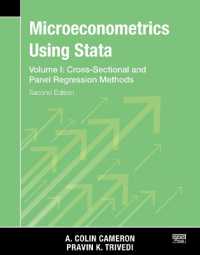- ホーム
- > 洋書
- > 英文書
- > History / World
基本説明
Provides a new interpretation of the emergence of farming economies and the dynastic state c.10,000-2,650 BC.
Full Description
In this authoritative and compelling 2006 survey of the archaeology of early Egypt, David Wengrow offers an interpretation of the emergence of farming economies and the dynastic state, c.10,000 to 2,650 BC. Exploring key themes such as the nature of state power, kingship and the inception of writing, Wengrow illuminates prehistoric social development along the Nile through comparison with neighbouring regions. Detailed analysis of the archaeological record reveals the interplay between large-scale processes of economic and political change and intimate material practices through which social identities were transformed, focussing upon ritual treatments of the dead. Employing rich empirical data and engaging critically with anthropological theory and the history of archaeological thought, Wengrow's work challenges the theoretical isolation of Egyptian prehistory and breaches the methodological boundaries that separate prehistory from Egyptology. It is essential reading for anybody with an interest in ancient Egyptian civilisation or early state formation.
Contents
Introduction: the idea of prehistory in the Middle East and North East Africa; Part I. Transformations in Prehistory: 1. Egypt and the outside world I, c.10,000-3300 BC; 2. Neolithic economy and society; 3. Domestication and embodiment in the Nile valley; 4. The urbanisation of the dead: Naqada I-II; 5. Image, ritual and the construction of identity in late prehistory; Part II. The Making of Kingship: 6. Opening considerations: la mémoire monarchique; 7. Egypt and the outside world II, c.3300-2500 BC; 8. The evolution of simplicity: Naqada III; 9. Extraordinary bodies and binding truths: early writing in context; 10. Theatres of sacrifice: dynastic constructions of death; Conclusion: subterranean histories of power.








